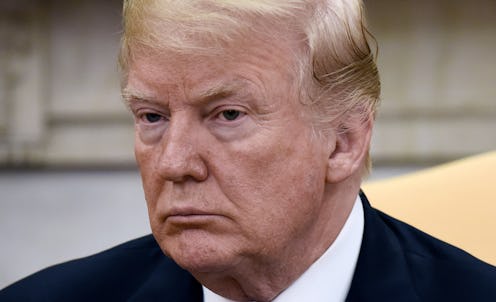News
Trump’s Latest Conspiracy Theory Goes Even Deeper Than “Deep State”

On Wednesday morning, President Trump took to Twitter and ranted about a supposedly corrupt investigation into his campaign that he has dubbed "Spygate." What does this mean to the POTUS? (He's definitely NOT referring to the 2007 scandal involving the New England Patriots' illegal taping of Super Bowl opponents the New York Giants.) Trump's subsequent Wednesday tweets make clear that he thinks his 2016 election campaign was wronged by the previous administration.
For Trump, "Spygate" involves an unconfirmed rumor that the FBI installed one of its operatives in the Trump campaign. According to CNBC, Rep. Devin Nunes — the chairman of the House Intelligence Committee — has asked for the identity of a source who related information about the Trump campaign to the FBI. Purportedly, it is this person who is believed to perhaps be an intelligence plant.
As New York Magazine's Benjamin Hart reports, all known information on the alleged spy's actions indicate he did not break any laws, and that Trump's public rants about the FBI's corrupt "Spygate" are not grounded in fact. Hart writes, "launching a counterintelligence investigation to ensure that campaign officials aren’t vulnerable to foreign influence and blackmail is standard operating procedure at the FBI, not a scandal."
The alleged actions taken by the spy involved several names that have since become familiar following Special Counsel Robert Mueller's investigation into Russian interference in the 2016 election. According to The Washington Post, the informant reportedly approached then-campaign adviser Carter Page in the summer of 2016, seeking to extract information under the guise of a foreign policy discussion. He also made contact with Trump's campaign co-chairman Sam Clovis and foreign policy adviser George Papadopoulos. The Post's article also notes that the FBI's use of informants and "unofficial" sources is common and allowed by the agency's regulations.
The New York Times ran its own article on the FBI informant, headlining that he was assigned "to Investigate Russia Ties to Campaign, Not to Spy, as Trump Claims." The Times pointed out that the FBI's source spoke with Trump campaign officials only after the agency learned they had reportedly had questionable contact with Russian operatives during the 2016 campaign.
Trump has claimed that this informant was "implanted" within his campaign "for political purposes." There is no evidence at this time that either of those assertions are accurate. But it does appear to back a narrative that Trump and his supporters certainly favor — that the Mueller investigation into possible collusion with Russia is a baseless and politically motivated attack on the president.
Wednesday morning's tweet storm from Trump encompassed seven tweets decrying the "Criminal Deep State," "Fake News," and the supposed "WITCH HUNT," all of which centered on his "Spygate" theory. The president even managed to tie in a swipe at Hillary Clinton via a gesture of solidarity with Bernie Sanders. According to Trump, the informant "was only there to spy for political reasons and to help Crooked Hillary win - just like they did to Bernie Sanders, who got duped!"
Trump has long been critical of the intelligence community. During the 2016 presidential election, Trump attacked the FBI for what he considered its poor and politically motivated handling of Clinton's use of a private email server while secretary of state. He has also repeatedly opposed the consensus view from the 17 U.S. intelligence agencies that Russia interfered in the 2016 election.
But while Trump may claim "Spygate" is a scandal, the evidence so far suggests the FBI never deviated from its standard operating procedure.